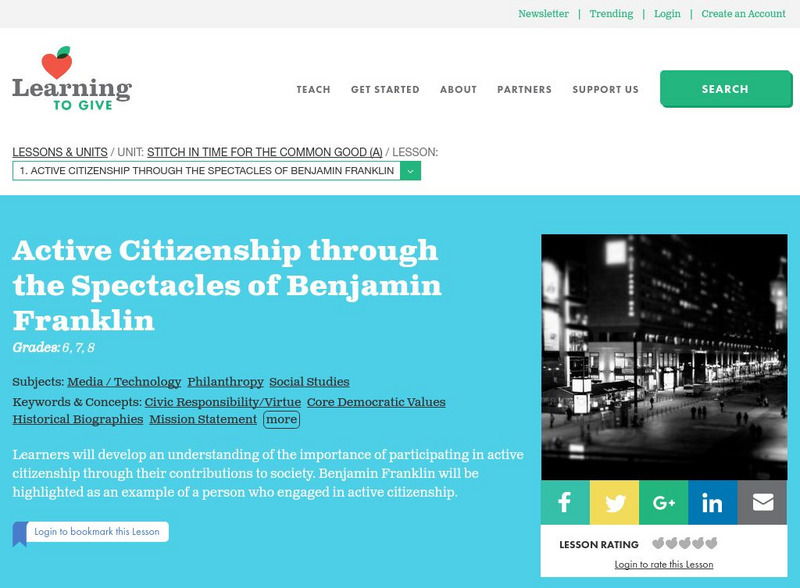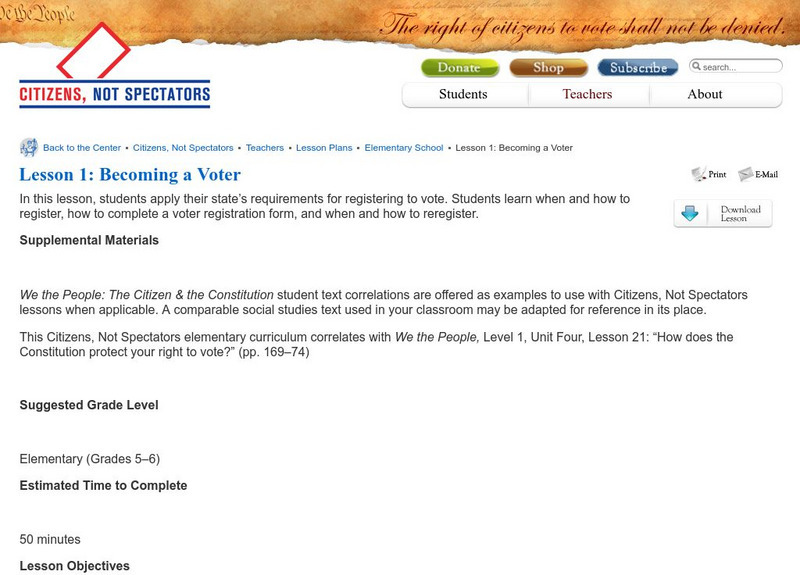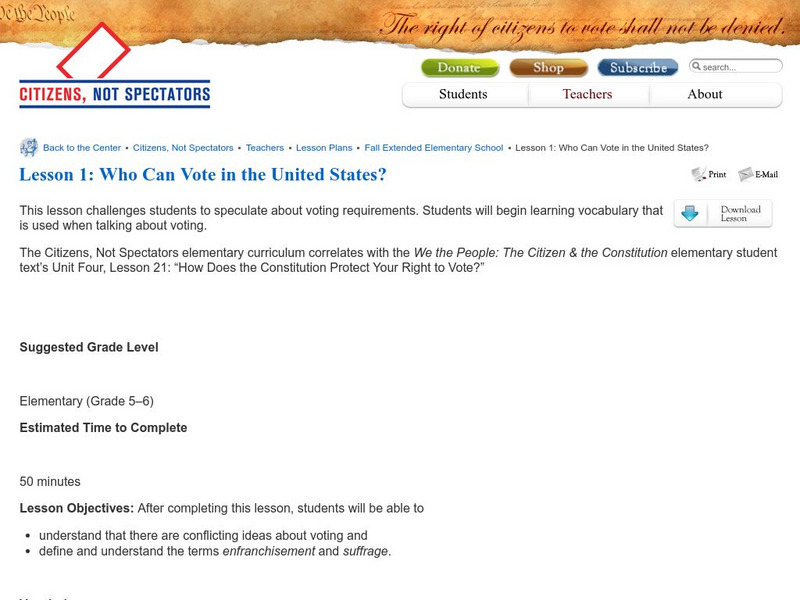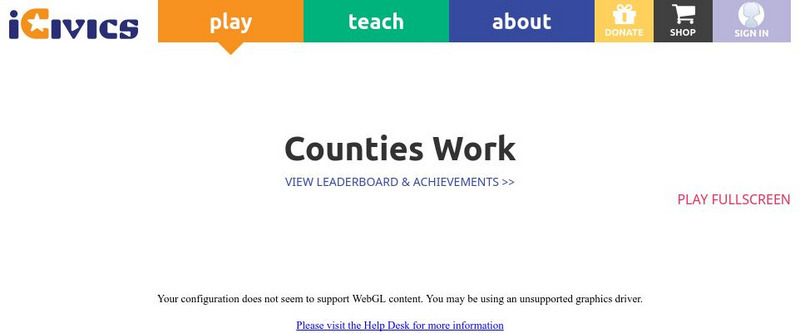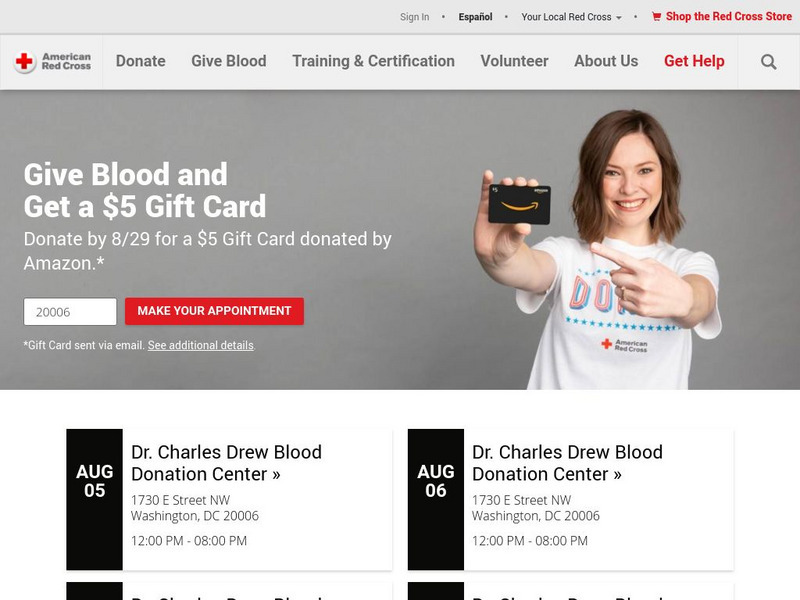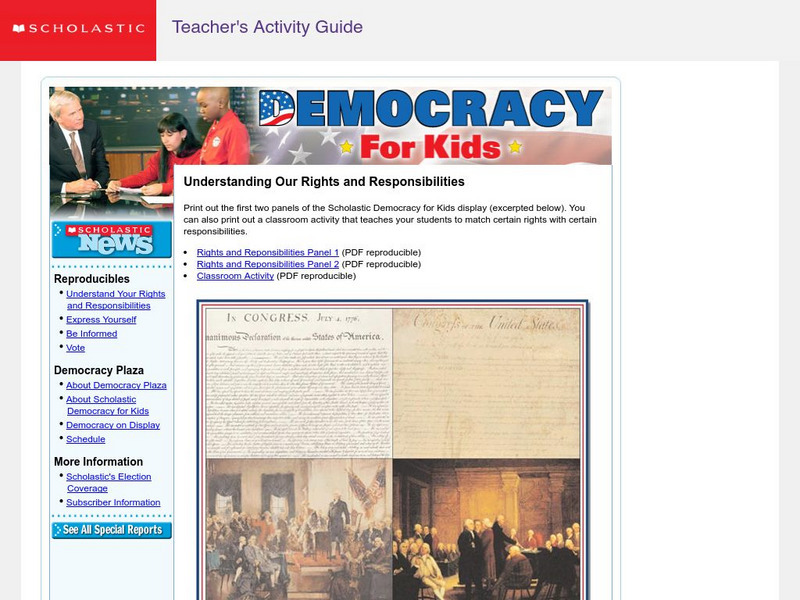Learning to Give
Learning to Give: Active Citizenship Through Spectacles of Ben Franklin
This detailed lesson plan has young scholars investigating and participating in their communities.
Center For Civic Education
Center for Civic Education: Becoming a Voter
In this instructional activity, students apply their state's requirements for registering to vote. Students learn when and how to register, how to complete a voter registration form, and when and how to reregister.
Center For Civic Education
Center for Civic Education: Who Can Vote in the United States?
This lesson challenges learners to speculate about voting requirements. Students will begin learning vocabulary that is used when talking about voting.
Center For Civic Education
Center for Civic Education: Becoming a Voter
In this lesson, students apply their state's requirements for registering to vote. Students learn when and how to register, how to complete a voter registration form, and when and how to reregister.
Center For Civic Education
Center for Civic Education: Becoming a Voter
In this lesson, students apply their state's requirements for registering to vote. Students learn when and how to register, how to complete a voter registration form, and when and how to reregister.
Center For Civic Education
Center for Civic Education: The Ballot and Questions
This lesson focuses on a voter's need to be fully informed prior to casting a vote on Election Day and how to acquire the necessary information.
iCivics
I Civics: Elk v. Wilkins (1884)
This mini-instructional activity examines the Supreme Court's ruling that the 14th Amendment's Citizenship Clause did not apply to American Indians born on Native reservations. Students analyze a primary document and discover how the...
iCivics
I Civics: Counties Work
Do you want to make your community a better place to live? In Counties Work, you decide about the programs and services that affect everyone! Your choices shape the community, and your citizens' satisfaction determines whether you'll get...
iCivics
I Civics: Who Represents Me?
Do you know who represents you in the federal, state and local government? Do you know how to get in touch with them? This web quest will guide you through a number of web resources that will give you information about your...
iCivics
I Civics: Early Rebellions Mini Lesson
As a new country, the United States experienced a lot of growing pains. Discover some of the citizen-led rebellions that occurred in the nation's first decades, and how the government grew to respond.
iCivics
I Civics: Wanted: A Just Right Government
Look at the tensions and differences of opinion that existed among early American states and citizens. Learn about the Articles of Confederation, why the first "constitution" didn't work, and how compromise led to the Constitution.
iCivics
I Civics: Clapper v. Amnesty International (2013)
This mini-lesson covers the basics of the Supreme Court's decision that determined the government's ability to conduct electronic surveillance of its citizens. Students learn about the First Amendment right to free speech, the Fourth...
iCivics
I Civics: Judges: Playing Fair
This mini-lesson examines the role of fair and impartial courts in American life. Students learn a basic overview of the judiciary branch, including how judges are appointed and held accountable by citizens.
iCivics
I Civics: Constitution Day Lesson Plan
This interactive lesson gives students a quick snapshot of the Constitution, including the purpose of each article, the powers of the three branches, how a bill becomes a law, and the concepts of separation of powers and checks and...
iCivics
I Civics: Obergefell v. Hodges (2015)
This mini-lesson covers the basics of the Supreme Court's decision that extended marriage rights to same-sex couples. Young scholars learn about the 14th Amendment's Equal Protection and Due Process Clauses, and how the Court's...
CPALMS
Florida State University Cpalms: Florida Students: Trial by Jury: You Decide!
Learn about trial by jury in this tutorial where you exercise your responsibility as a citizen by serving on a jury and deciding on a case. A PDF file of the tutorial is available.
Other
Dirksen Center: Why Is It Important to Vote?
A basic right in a democracy. We know we should vote, but does our vote mean anything? Good answers to some good questions. This site provides many classroom resources.
Other
American Red Cross
Home page of the American Red Cross with links to disaster services, biomedical services, international services, community services, military services, health and safety services, volunteer services, and youth services. Also includes...
Other
Points of Light
The mission of the organization is to instill compassion and the idea of service and philanthropy in school children. Find out how to start a Care Club and what projects the children can participate in.
PBS
Pbs Learning Media: Your America: Democracy's Local Heroes: Teacher's Guide
Inspire civic awareness, promote student activism and examine the rights and responsibilities of American citizenship by exploring stories of how ordinary citizens accomplished extraordinary changes.
PBS
Pbs Learning Media: Your America: Democracy's Local Heroes: Student Guide
Investigate the rights and responsibilities of American citizenship focusing on examples of citizens who took action to effect positive changes. Explore ways in which students can become involved in their communities.
Scholastic
Scholastic: Understanding Our Rights & Responsibilities
Scholastic presents a series of printable panels and a classroom activity in PDF format that highlight the rights and responsibilities of U.S. citizens.
Ohio Test Prep
Ohio Test Prep: Module 5: Role of the People
Test preparation material includes video tutorial, interactive review, and assessment for students taking Ohio state test in Social Studies. Students review how the government of the United States protects the freedoms of its people and...
Read Works
Read Works: Born to Run
[Free Registration/Login Required] An informational text debating the necessity of Article II, Section 1 of the Constitution which states that only natural-born American citizens can be elected President of the United States. A question...
